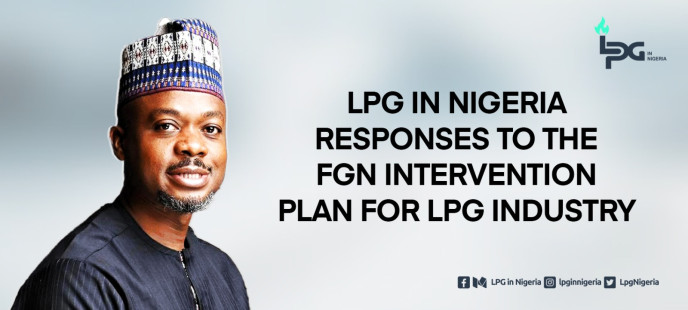- 3793
- 0
Sharing Ideas and Updates on LPG in Nigeria and related information to enable effective collaboration within the LPG Value Chain
LPG In Nigeria Responses To The FGN Intervention Plan For LPG Industry

The Minister of State for Petroleum Resources (Gas), Rt. Hon. Ekperikpe Ekpo, introduced new policies to address the recent spike in Liquefied Petroleum Gas (LPG) prices, which rose to N1,500 per kg, placing a heavy burden on Nigerians. Starting November 1, 2024, domestic LPG producers, including NNPCL, will halt exports to ensure local supply. Also, the Nigerian Midstream Downstream Petroleum Regulatory Authority (NMDPRA) will establish a pricing framework within 90 days to base LPG costs on local production rather than global rates. Over the next year, the government will build facilities to blend, store, and distribute LPG domestically. These actions are intended to stabilize prices, secure local availability, and reduce economic strain on Nigerian households.
The founder of LPG in Nigeria, Mr Godwin Okoduwa was engaged on the recent attempt by the Federal Government to force down the price of LPG otherwise known as Cooking Gas as it bans export.
Please find below excerpts of the interview.
1. What factors have contributed to the continuous increase in LPG prices in Nigeria despite domestic production?
Ans: LPG prices in Nigeria have largely been deregulated, which means that there has been no government intervention; allowing market forces to determine price directions. The other major factors are International prices ( e.g. Mont Belvieu and Argus ) which leads to the Exchange rate. With prices the USD/Naira Exchange rate changing by over 100% since June 2023, we can expect same increase local prices.
- How have global pricing indices and local supply chain issues affected pricing?
Ans: Global price indexes play a very critical part in pricing as the cost of LPG is based on it which is presently about 60% of the cost, when you include premium, it can be up to 80%. This means that changes in international prices and Exchange rates can largely determine the direction of local LPG prices. However, for Propane LPG, we have seen a separate pricing mechanism which isn’t quite clear, though internationally Propane prices are about the same as Butane, they aren’t imported, and all Propane presently consumed in the country is local which means, landing cost is without the freight cost.
2. Why do you think the previous efforts, such as forming a high-level committee, have failed to stabilize LPG prices?
- Were there any structural or market limitations that might have hindered the committee's work?
Ans: The extent of the committee’s work is unknown, but if you look at the sources of LPG being imported, you will mention the Mobil BRT in Bonny and Chevron Escravos facility. While the Chevron facility needs infrastructure to make the LPG which has a lot of propane, more market-acceptable, BRT Bonny volumes could come straight into the market. However, the real crux of the matter is the pricing index, how do you ask an entity to change its pricing index after making an initial investment based on that pricing index, it is like changing the goalpost.
3. How feasible is it for NNPCL and other LPG producers to immediately stop exporting domestically-produced LPG?
- What challenges or pushback might this directive face from industry stakeholders or international partners?
Ans: Very feasible , but it requires a lot of creativity. The LPG producers are faced with the challenge of pricing appropriately without hurting their bottom line. The other challenge is , what pricing can be adopted locally , that would make investment in LPG infrastructure viable? Can the pricing structure be sustained? Can it form a realistic or sustainable revenue basis for a project investment?
4. What impact will a domestic pricing framework have on the affordability of LPG in Nigeria?
- How would pegging LPG prices to in-country production costs instead of external markets affect Nigerian consumers and producers?
Ans: The reason for the domestic pricing framework is to bring down the cost of LPG in the country. So in the immediate term it would benefit the consumers, in the long run it could lead to stifling of LPG infrastructure investment. Let’s remember that the industry grew by over 1000 % since 2007 when NLNG began its intervention. The issue in the LPG industry is not peculiar to the industry, it should be allowed to run. A proper assessment of how the required intervention is required at this time.
5. Are there any potential risks associated with halting LPG exports, especially in terms of revenue generation or international trade agreements?
- How might this decision impact Nigeria's overall economy, particularly its foreign exchange earnings?
Ans; Stifling of further LPG infrastructure investment.
6.What long-term effects do you foresee from the development of facilities to blend, store, and deliver LPG domestically?
- Could this strategy lead to sustainable price stabilization, or will it merely address short-term supply concerns?
Ans: Development of blending infrastructure isn’t new in the industry. However the emphasis on blending may be because of the LPG from Chevron, which could take care of 40% of the present consumption in Nigeria.
7. How do you think the Gas Minister’s directives will affect the overall energy market in Nigeria, beyond just cooking gas?
- Could these policies have a knock-on effect on other energy sectors or consumer goods?
Ans: It could send a wrong message to investors, it must be handled carefully.
8. What is your opinion on the timeline given (12 months for long-term solutions)?
- Is it realistic considering the current infrastructure and economic conditions in Nigeria?
Ans: It is an audacious timeline, but it can be done; for instance Germany had to build LNG plants in record time, waiving the required EIA which would have taken at least a year.
















0 Comment.